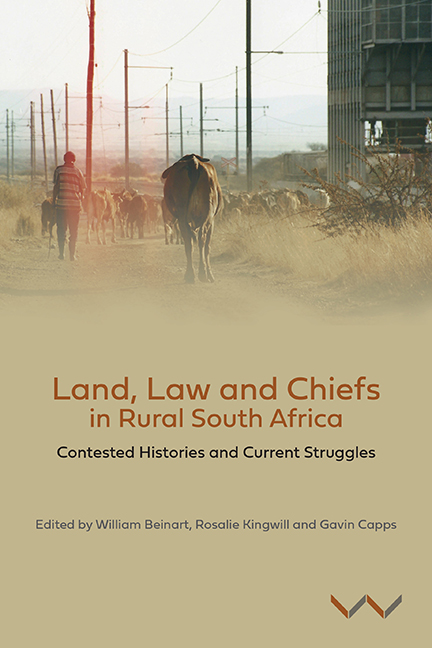Book contents
- Frontmatter
- Contents
- Maps
- Acronyms and Abbreviations
- Preface
- Introduction Land, Law and Chiefs: Contested Histories and Current Struggles
- Chapter 1 Constitutional Court Judgments, Customary Law and Democratisation in South Africa
- Chapter 2 Was ‘Living Customary Law’ There All Along?
- Chapter 3 When Custom Divides ‘Community’: Legal Battles over Platinum in North West Province
- Chapter 4 Chiefs, Mines and the State in the Platinum Belt: The Bapo-ba-Mogale Traditional Community and Lonmin
- Chapter 5 Mining, Graves and Dispossession in Mpumalanga
- Chapter 6 The Abuse of Interdicts by Traditional Leaders in South Africa
- Chapter 7 Resisting the Imposition of Ubukhosi: Contested Authority-Making in the Former Ciskei
- Chapter 8 Black Landlords, Their Tenants and the Native Administration Act of 1927
- Chapter 9 Customary Law and Landownership in the Eastern Cape
- Chapter 10 A History of Communal Property Associations in South Africa
- Chapter 11 ‘This is Business Land’: The Hlolweni Land Claim, 1983–2016
- Chapter 12 Restitution and Land Rights in the Eastern Cape: The Hlolweni, Mgungundlovu and Xolobeni Cases
- Contributors
- Index
Chapter 7 - Resisting the Imposition of Ubukhosi: Contested Authority-Making in the Former Ciskei
Published online by Cambridge University Press: 15 June 2021
- Frontmatter
- Contents
- Maps
- Acronyms and Abbreviations
- Preface
- Introduction Land, Law and Chiefs: Contested Histories and Current Struggles
- Chapter 1 Constitutional Court Judgments, Customary Law and Democratisation in South Africa
- Chapter 2 Was ‘Living Customary Law’ There All Along?
- Chapter 3 When Custom Divides ‘Community’: Legal Battles over Platinum in North West Province
- Chapter 4 Chiefs, Mines and the State in the Platinum Belt: The Bapo-ba-Mogale Traditional Community and Lonmin
- Chapter 5 Mining, Graves and Dispossession in Mpumalanga
- Chapter 6 The Abuse of Interdicts by Traditional Leaders in South Africa
- Chapter 7 Resisting the Imposition of Ubukhosi: Contested Authority-Making in the Former Ciskei
- Chapter 8 Black Landlords, Their Tenants and the Native Administration Act of 1927
- Chapter 9 Customary Law and Landownership in the Eastern Cape
- Chapter 10 A History of Communal Property Associations in South Africa
- Chapter 11 ‘This is Business Land’: The Hlolweni Land Claim, 1983–2016
- Chapter 12 Restitution and Land Rights in the Eastern Cape: The Hlolweni, Mgungundlovu and Xolobeni Cases
- Contributors
- Index
Summary
South Africa forms the arena of a protracted ‘“fight for ubukhosi” – a struggle by chiefs for the recognition of the institution of chieftainship and of chiefly power’ (Mager and Velelo 2018: 15). With the transition to democracy, as part of the political negotiations, iinkosi succeeded in ensuring that traditional leadership was recognised in the 1996 Constitution ‘according to customary law’ (Southall and Kropiwnicki 2003; Oomen 2005; Ntsebeza 2011). Though constrained by the Constitution, their influence on the government has increased considerably, particularly through the vehicle of the Congress of Traditional Leaders of South Africa (CONTRALESA).
The fight for ubukhosi is pursued at both central and local levels. We have decided to use largely the isiXhosa terms because we wish to make the point that the English words, ‘king’, ‘chief ‘ and ‘headman’, do not adequately capture the descriptions of various levels of the traditional leadership hierarchy, inkosana (headman or headwoman), inkosi (senior traditional leader), ikumkani (king). We should recognise that these terms are changing, and this is the usage now promoted by the provincial government and the Department of Cooperative Governance and Traditional Affairs, but they are also found in many rural communities in the Eastern Cape and in this sense we are seeking to decolonise the language used to refer to the institution of traditional leadership. Regarding the central government, the legislative arena has been fundamental. Parliament has drafted a slew of proposals aiming to formalise and centralise the power of senior traditional leaders. The Traditional Leadership and Governance Framework Act of 2003 (TLGFA) recognised traditional leadership within apartheid-era boundaries, but simultaneously tried to make traditional authority somewhat more democratic by introducing the requirement that 40 per cent of the members of traditional councils should be elected and one-third women. Section 25(2a) of TLGFA mandated the establishment of a Commission on Traditional Leadership Disputes and Claims to investigate and resolve all traditional leadership disputes in the country, as well as traditional authority boundary disputes and the establishment, disestablishment, merging or division of ‘tribes’.
The traditional council membership requirements have, however, been ignored in many provinces and the government has not taken action against defaulting councils. And the Commission on Traditional Leadership Disputes and Claims proved unequipped to deal with the high number of claims and unable to ‘cleanse [traditional authority] of its apartheid accretions and deformities’ (Peires 2014: 15; Buthelezi and Skosana 2018).
- Type
- Chapter
- Information
- Land, Law and Chiefs in Rural South AfricaContested histories and current struggles, pp. 141 - 163Publisher: Wits University PressPrint publication year: 2021



